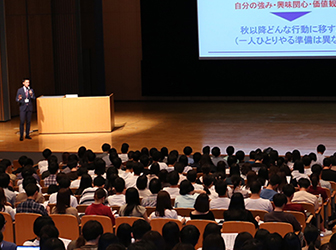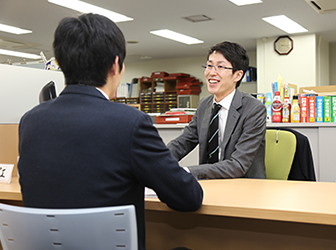Founded in 1881Classic Yet Innovative Mixing History and Tradition with Modern Ways of Thinking
Meiji University was originally established as Meiji Law School by three young lawyers in 1881, in the early years of modern Japan. Since that time, Meiji has continued for over 140 years as one of Japan’s leading private universities. But Meiji University has not remained rooted in tradition. It is an institution that has always moved forward and anticipated future developments.
Based on the principle of “Empowering the Individual,” Meiji University aims to constantly lead the world by tackling new challenges and moving toward a new era.
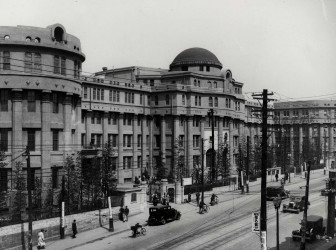
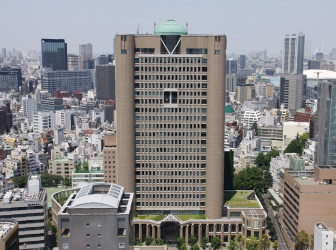
The 3 FoundersAims of Three Young Lawyers -Tatsuo Kishimoto, Kozo Miyagi and Misao Yashiro
The predecessor of Meiji University was Meiji Law School, which was founded in 1881 by three lawyers in their late 20s. All three were members of provincial feudal clans. Amid the upheaval and reformation that occurred when the Edo period (1603–1867) came to an end in Japan, they moved to Tokyo at the direction of the newly formed Meiji government, having been selected among their clans as scholarship students. In Tokyo, they studied French law. Upon the opening of the law school, the founders divided their responsibilities, with Kishimoto taking charge of French commercial law, Miyagi Japanese criminal law and Yashiro civil procedure law.
The three men shared a passion for respecting the rights of the individual toward creating a free society and in wanting to promote the development of intelligent young people to lead a modern civil society. These are the origins of Meiji University’s founding spirit of Rights and Liberty as well as Independence and Self-Government.
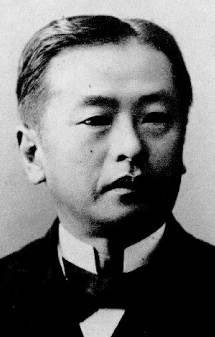
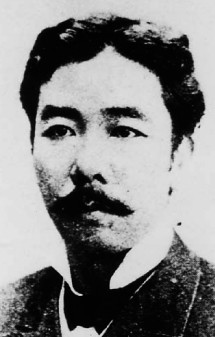
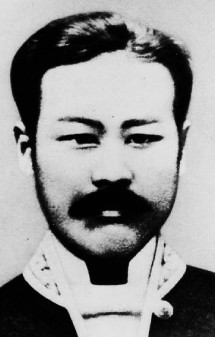
Museum Established in 1929A symbol of the university’s openness to society, attracting 110,000 visitors annually
With a history dating back to 1929, the Meiji University Museum has some 450,000 items in its collection. Some of these items are on display in the permanent exhibition room, which is comprised of three departments: Criminal Materials, Commodities, and Archeology. The special exhibition room hosts a variety of exhibitions showcasing the results of research and education at Meiji University. The Meiji University Museum has been open to the general public free of charge since the 1950s, well ahead of most other university museums in Japan. Attracting around 110,000 visitors annually, the museum is a symbol of Meiji University’s openness to society. Adjacent to the museum is an exhibition hall chronicling the history of Meiji University and the AKU YOU Memorial Museum, dedicated to the renowned lyric writer and novelist You Aku, an alumnus of Meiji University.
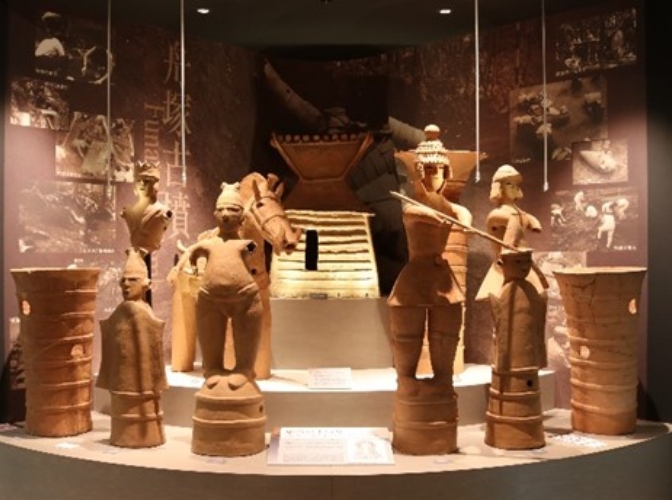
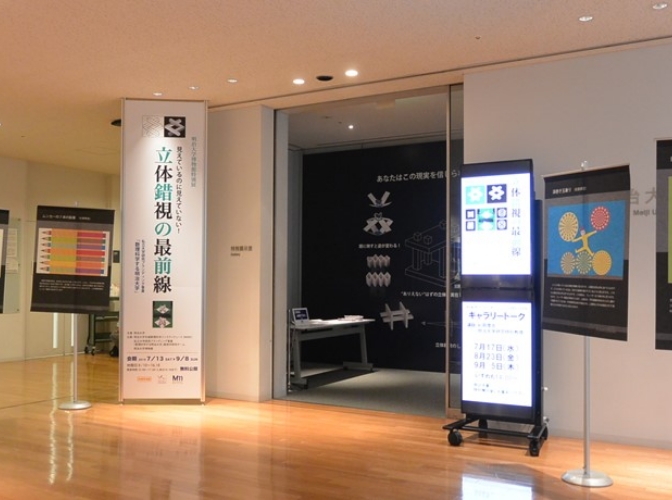
Desirability Ranking: 1stJapan’s Most Popular University
With Japan’s declining birthrate, the number of people aged 18 years is now just 1.10 million. But for 14 years in a row, the number of applicants to Meiji University has exceeded 100,000.
* Meiji was selected as the university in the Kanto area (Tokyo region) to which the most humanities and social sciences students wished to apply, according to Shingaku Burando Ryoku Chosa 2023 (“2023 Survey of University Brand Power for New Entrants”), produced by Recruit Marketing Partners.
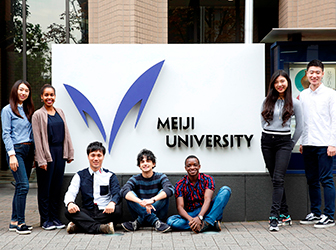
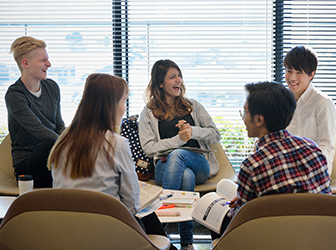
From Tokyo Station: 5 MinutesIn the Heart of Tokyo
Tokyo is an international megalopolis that boasts a population of 14 million people and is the political, economic, commercial, academic and cultural center of Japan. With its vast accumulation of goods and information, Tokyo is a city of constant, dynamic change. But it is also where culture and tradition live on from the pre-modern days when it was known as Edo. As such, Tokyo has all the excitement of a colossal theme park. And Meiji University is located in the heart of Tokyo.
From Tokyo Station to Ochanomizu Station (the closest station to Meiji’s Surugadai Campus), it takes just 5 minutes by train. The campus is a 3-minute walk from Ochanomizu Station. Akihabara—the mecca of Japanese pop culture, with many stores specializing in electronic goods—is a 15-minute walk. The other three campuses have direct train connections with Shinjuku (one of Tokyo’s major centers) and traveling times of 4 to 30 minutes. Meiji University thus offers outstandingly good access within the city.
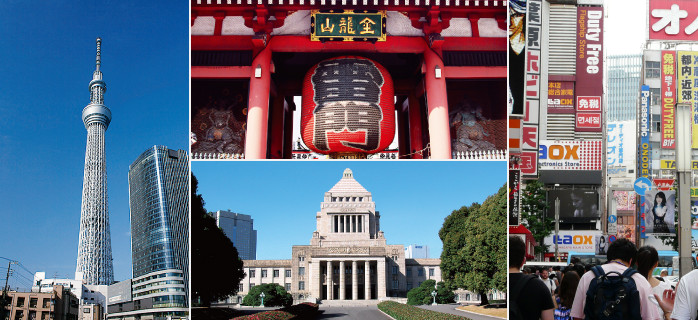
Students: 34,000A Diverse Student Body
There are 34,000 students at Meiji University. Though Meiji is certainly a large university, a particular merit of its educational system is the emphasis on small classes. And it is a place that attracts students not only from the Tokyo metropolitan area, but from all of Japan’s prefectures and around the world.
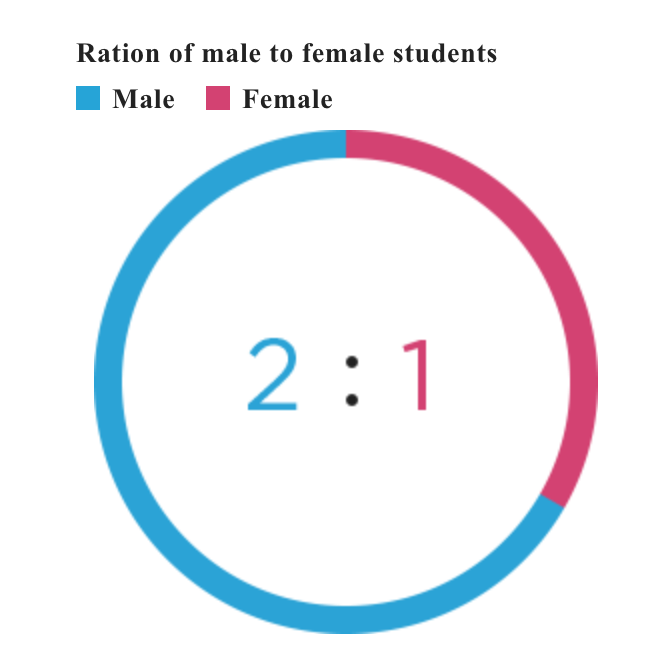
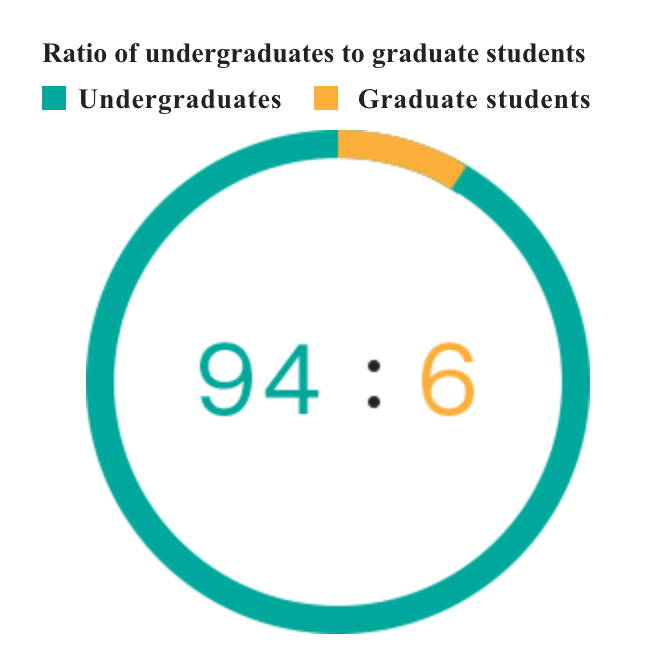
International Students Annually: 2,300+Global Campus: Sense of Japan; Sense of the World
Meiji University has focused on promoting campus internationalization, and it accepts many international students every year. There are exchange students from around 60 countries, and Meiji actively accepts such students through entrance examinations, student exchange programs (interuniversity and interfaculty) and short-term programs The places with the largest numbers of regular international students (international students enrolled toward obtaining a degree) are China (53%), South Korea (26%), and Malaysia, Taiwan and the United States.
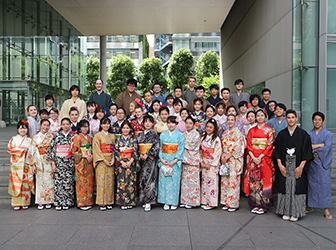
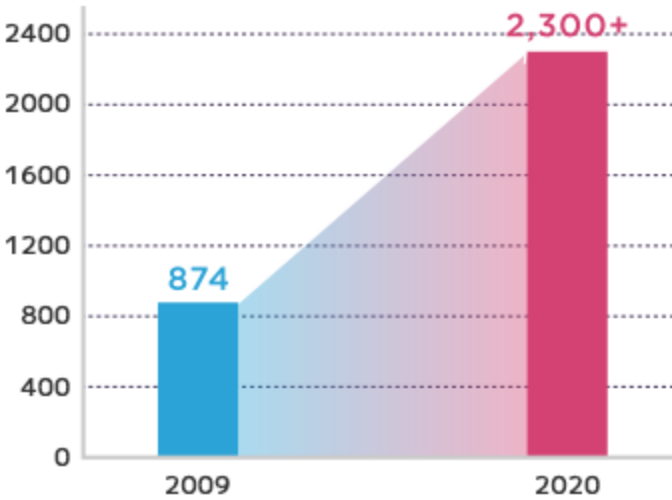
Graduates: 590,000Meiji Graduates Around the World
Since 1882, when the first students graduated from Meiji Law School, the Meiji network has spread throughout Japan and the world. Meiji University alumni have made an impact on society in such varied areas as politics, business, culture, entertainment, sports and the mass media.
Examples include Japan's first three female lawyers, Masako Nakata, Yoshiko Mibuchi and Ai Kume. Another alumnus was Tatsuji Fuse, a human rights lawyer who dedicated his life to advancing the cause of society’s most vulnerable in the early part of the twentieth century and received the Order of Merit for National Foundation from South Korea. In the world of music, You Aku wrote a huge number of best-selling songs, and Masao Koga, recipient of the People’s Honor Award of Japan, composed many popular songs for such artists as Hibari Misora. Naomi Uemura was the first person in the world to scale the highest peaks on five continents.
The great diversity in the network of Meiji University graduates is a strong feature of this institution.
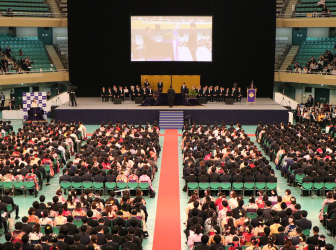
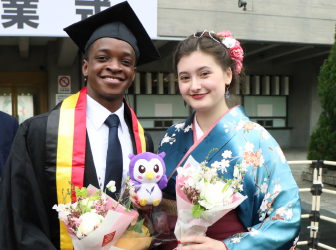
Graduation ceremony
Degrees in English: 9Gaining Degrees Completely in English
At Meiji University, there are nine degree programs in which students can obtain a degree using only English. In all, over 870 classes (excluding language classes) are held in English. Meiji University is making great efforts to enhance that number and quality.
Degree Programs in English
【Bachelor’s】
- ■ School of Global Japanese Studies (since 2011)
【Master’s】
- ■ Graduate School of Science and Technology; Architecture and Urbanism Program; International Program in Architecture and Urban Design (since 2013)
- ■ Graduate School of Business Administration; Double Master’s Program with University of Technology Malaysia (since 2013)
【Master’s (professional)】
- ■ Graduate School of Governance Studies (since 2013)
- ■ Graduate School of Global Business (since 2020)
【Doctorate】
- ■ Graduate School of Advanced Mathematical Sciences; Mathematical Sciences Program (since 2011)
- ■ Graduate School of Global Governance (since 2014)
- ■ Graduate School of Science and Technology; Architecture and Urbanism Program; International Program in Architecture and Urban Design (since 2017)
- ■ Graduate School of Advanced Mathematical Sciences; Frontier Media Science Program (since 2017)
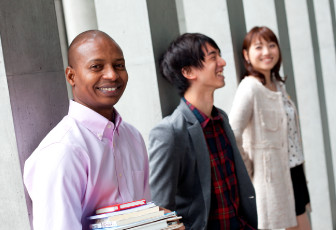

Prime Minister Graduates: 2Two Japanese Prime Ministers
Two prime ministers of Japan were graduates of Meiji University: Takeo Miki (66th prime minister) and Tomiichi Murayama (81st prime minister).
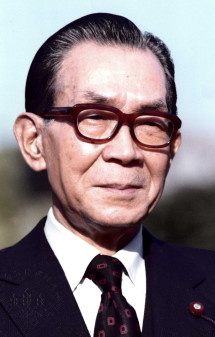
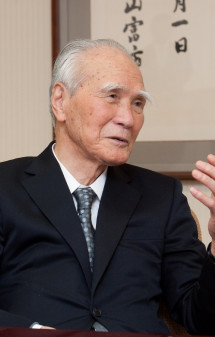
Overseas Offices: 3Strengthening Relationships with ASEAN Countries
Meiji University operates three overseas offices: Meiji University ASEAN Center, established in 2013 in Srinakharinwirot University, Bangkok, Thailand; Meiji University Beijing Office, established in 2011 in Chaoyang District, Beijing, China; and Malaysia Satellite Office, established in 2007 in the University of Technology Malaysia.
The university has established partnerships with 15 academic institutions in ASEAN nations, with a focus on Cambodia, Laos, Myanmar and Vietnam (CLMV). Meiji has held various exchange programs, such as the Innovative Faculty Development Workshop and CLMV Student Conference, using the ASEAN Center as a hub.
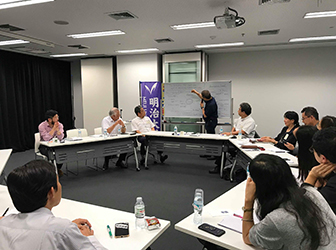
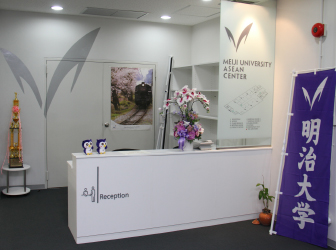
Teaching Staff from Overseas or with Overseas Degrees: 20%Globalized Teaching Staff
Meiji employs approximately 1,000 full-time faculty members. Among full-time teaching staff at the university, approximately 20% are from overseas or hold degrees from universities abroad.
In order to expand English-medium degree programs and other classes taught in English, Meiji is proactively recruiting non-Japanese nationals and individuals with degrees from institutions outside Japan to teach classes in languages other than Japanese.
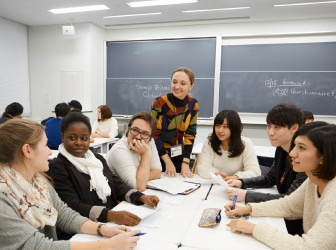
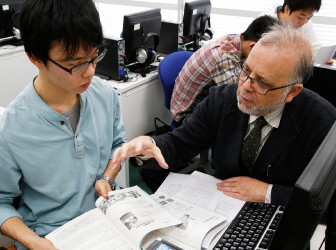
Campuses: 4Urban University
Meiji is an urban university in the heart of Tokyo, and it has four campuses: Surugadai, Izumi, Ikuta, and Nakano. Izumi Campus is for freshmen and sophomores studying humanities (except students in the School of Global Japanese Studies). Surugadai Campus is for junior and senior year students. Ikuta Campus caters to science students (School of Science and Technology, School of Agriculture). Nakano Campus is for students in the School of Global Japanese Studies and School of Interdisciplinary Mathematical Sciences.
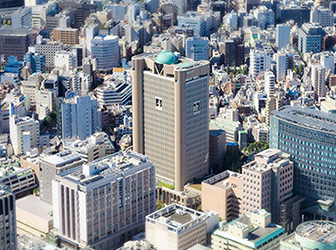
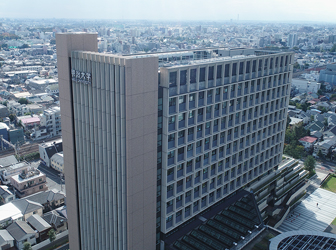
10 Undergraduate Schools, 16 Graduate SchoolsUndergraduate and Graduate Schools for Those Wanting to Learn
Meiji University is a comprehensive multidisciplinary institution with 10 undergraduate and 16 graduate schools. The university’s knowledge community covers a broad variety of academic fields and delivers learning programs that satisfy all forms of intellectual curiosity. It provides an environment that offers students the opportunity to acquire a wide-ranging, multidisciplinary perspective.
School of
Law / Commerce / Political Science and Economics / Arts and Letters / Science and Technology / Agriculture / Business Administration / Information and Communication / Global Japanese Studies / Interdisciplinary Mathematical Sciences
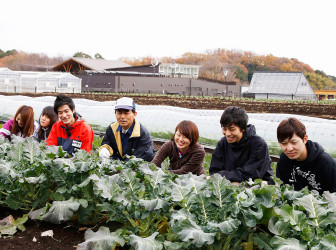
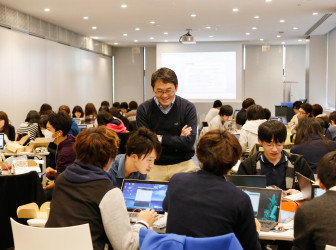
Olympic and Paralympic Athletes: 290+, Medals Won: 46Meiji Dominates in Sports
Since the formation of five sports clubs in 1905, the Meiji University Athletic Association, which now numbers 46 clubs, has been a leading force in the world of university sports and has played a significant role in their development. That trend is certainly evident with the Olympics and Paralympics. Beginning with the 1920 Olympic Games (VII Olympiad), held in Antwerp, Belgium, over 290 Meiji alumni have participated in the summer and winter games and earned 46 medals (17 gold, 13 silver and 16 bronze). At the 2020 Tokyo Olympics, gold medals were won in table tennis mixed doubles by Jun Mizutani (who graduated from the School of Political Science and Economics in 2013), and in baseball by Masato Morishita (who graduated from the School of Political Science and Economics in 2020). Jun Mizutani and Koki Niwa (who graduated from the School of Political Science and Economics in 2017) were also part of the men’s table tennis team that brought home the bronze medal. Wakaba Higuchi also claimed bronze with the women’s figure skating team at the 2022 Beijing Winter Olympics. Meiji has also produced many professional athletes in such sports as baseball and soccer.
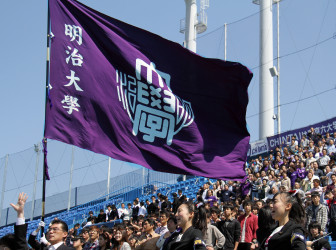
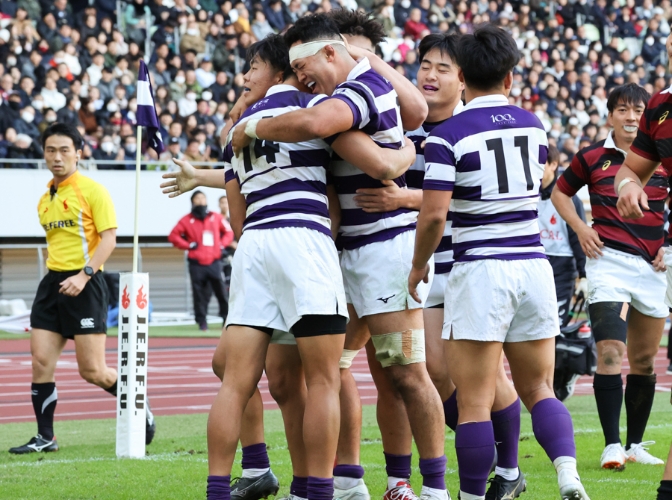
Partner Agreements with 57 Countries and 366 Universities and InstitutionsGlobal Network
Meiji’s first partner agreement began in 1986 with York University (Canada). For the purposes of joint research and student exchange, Meiji University has since greatly expanded its number of partner universities. Partner universities do not act only as study abroad destinations for Meiji students--they also send their own students to study at Meiji, and every year around 400 exchange students enroll in Meiji’s undergraduate and graduate schools.
Accommodation for exchange students is provided in the form of dormitories. Examples here are Meiji University Global Village (which also houses Japanese students) and Izumi International House (which has Japanese-style rooms, allowing exchange students to experience Japanese culture).
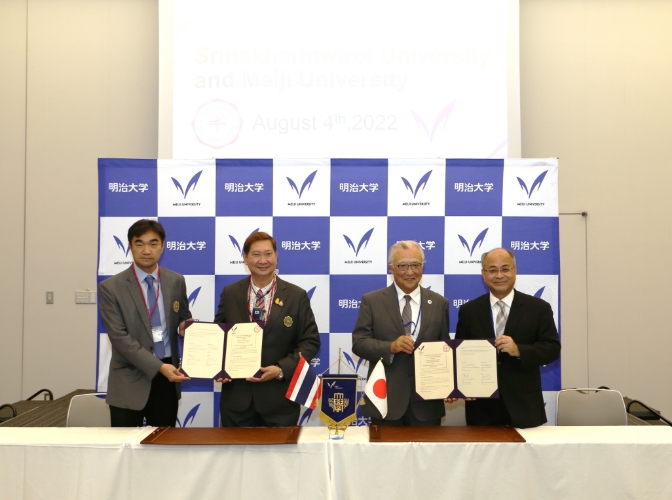
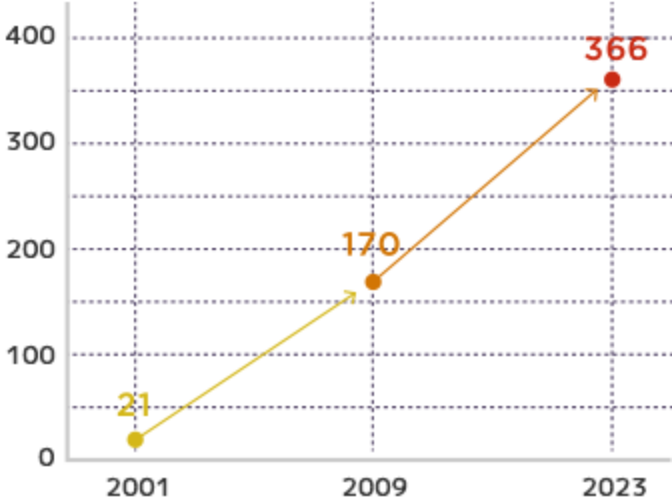
World-Class Research Centers: 14Advancing World-Class Research
To promote international-standard research, Meiji University’s Organization for the Strategic Coordination of Research and Intellectual Properties has defined priority areas and established 14 research centers. Joint research is promoted with universities and research institutes overseas. One of the 14 research centers is the Meiji University International Institute for Bio-Resource Research (MUIIBR), headed by Professor Hiroshi Nagashima of the School of Agriculture. He is a world authority on pig somatic cell cloning technology. The wide range of research areas includes the following: the Meiji Institute for Advanced Study of Mathematical Sciences (MIMS), which aims to become an international research center in the area of phenomenological mathematics; the Meiji University Research Institute for the History of Global Arms Transfer (RIHGAT); the Meiji University International Institute for Materials with Life Functions; and the Meiji Renewable Energy Laboratory (MREL).
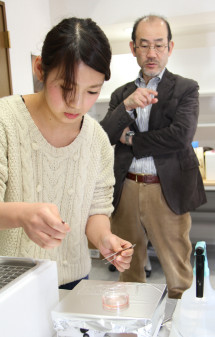
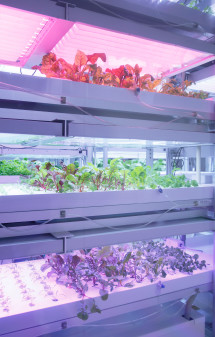
Japanese Language Classes for International Students
Subjects: 38, Classes: 230+Hone Your Japanese-Language Ability to Take Highly Specialized Classes at Meiji
To meet the needs of international students, more than 230 classes in 38 subjects are provided by the Japanese Language Education Center as well as by each school. When international students take classes together with Japanese students, the international students receive support from the Japanese Language Education Center so that they can adequately understand the content of lectures. Starting with introductory courses for international students (including exchange students) enrolled in each school, classes are differentiated by language level. Language classes focus on oral expression, written expression, reading comprehension, speed-reading and composition. The aim is to provide a comprehensive, high-quality Japanese language education.
The President’s Cup Japanese Speech Contest for International Students has been held since 1996. This has become a perfect opportunity for students to showcase the fruits of their Japanese study, and every year many international students give speeches on their individual topics in Japanese.
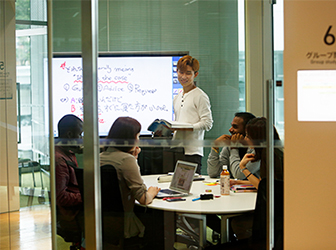
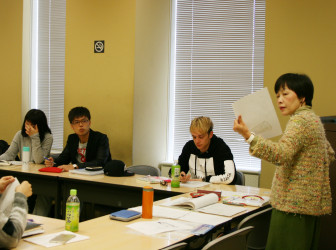
Mixed Student Dormitories: 2Learning Center Where International and Japanese Students Live Together
Meiji has two mixed student dormitories: Meiji Global Village (MGV) on the Izumi Campus and Komae International House, which offers convenient access to the Ikuta Campus.
These mixed student dormitories operate on a Resident Assistant (RA) system, which helps international students when they move in to the dormitory and also supports them in their daily lives, as well as managing events in the dormitory. These dormitories are more than just somewhere for students to live: they are places where Japanese and international students live together while sharing a space for study and cultural exchange.
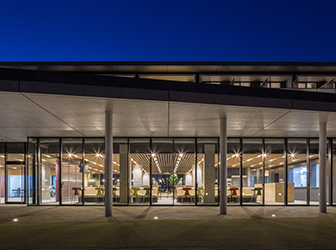
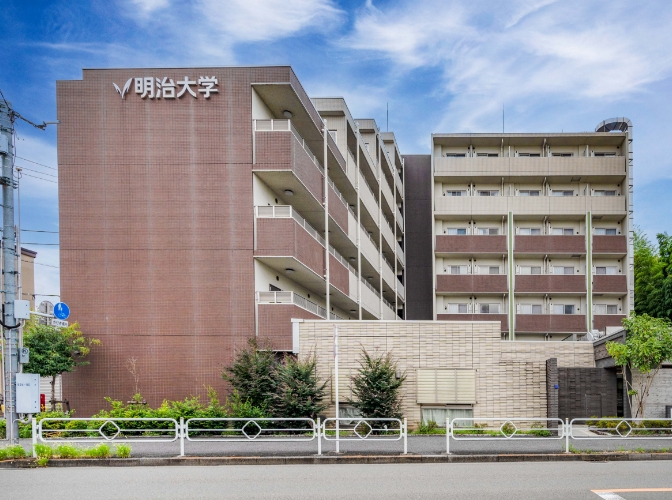
Certified Clubs: 330Club Activities to Empower the Individual
Irrespective of academic year or university department, students sharing similar interests and goals get together to pursue club activities. The various clubs are active on a daily basis and range from sports and traditional Japanese culture to unique pursuits like Rakugo (traditional Japanese storytelling). More than half of all students (17,000 individuals) take part in extracurricular athletics and club activities.
International students also participate in club activities and thereby become familiar with different aspects of Japanese culture and various places in Tokyo.
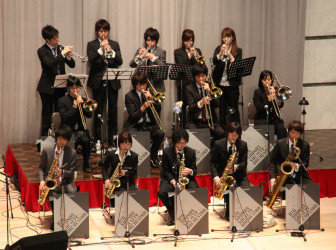
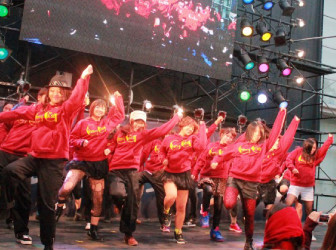
Specialist Manga Libraries: 2Manga Libraries at the University: A Collection of 400,000 Publications Related to “Cool Japan”
Building on the 140,000 books and materials donated by Meiji graduate Yoshihiro Yonezawa’s family, the Yoshihiro Yonezawa Memorial Library of Manga and Subcultures (a special library) opened at the Surugadai Campus in 2009. Meiji also has a major manga archive in the form of the Contemporary Manga Library, which was built around the collection of Toshio Naiki, the founder of Japan’s first manga library.
Manga, anime and video games are a reflection of Japanese society, social conditions and lifestyles. As a result, they possess considerable academic and cultural value. In recent years, this area has represented a notable cultural export from Japan to the world at large. Toward clarifying the history and growth of this phenomenon, Meiji University has made a systematic, comprehensive collection of materials, and the School of Global Japanese Studies has promoted research and education in this field.
In addition to the Manga Library, each of the four campuses has its own university library, and the total number of housed publications is over 2.7 million.
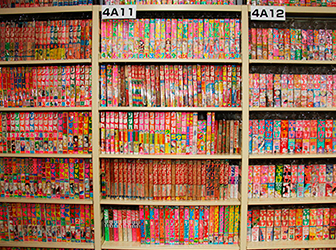
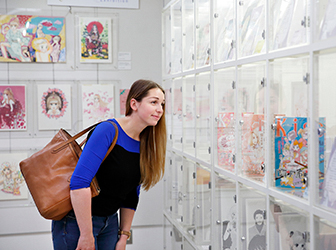
Yoshihiro Yonezawa Memorial Library of Manga and Subcultures (special library)
Meiji Students Studying Abroad Annually: 2,300+Meiji Students: “Go Forward, Go Global”
There are many ways for Meiji students to study abroad, such as partnership agreements (interuniversity and interfaculty) and short-term programs. Every year, many students go out into the world to study after having selected a country, period or program that meets their individual needs.
Meiji’s own undergraduate student exchange programs are substantial and include the following: University of Cambridge Corpus Christi College Summer Law Course (UK) in the School of Law; International Agricultural and Cultural Understanding Program (Thailand) in the School of Agriculture; and the Florida State University International Exchange Program as part of the Walt Disney World International College Program (USA) in the School of Global Japanese Studies.
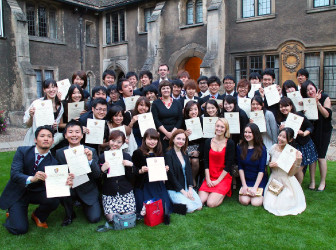
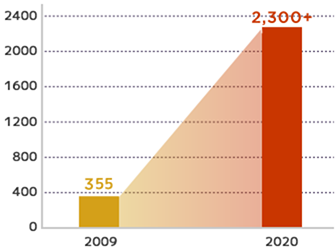
Lifelong Learning Courses Open to Working Adults: 33019,000 Working Adults Pursue Learning Opportunities Every Year
Liberty Academy was established as a lifelong learning facility so that Meiji University could restore its intellectual properties to society. The academy offers numerous opportunities for learners across Japan, including liberal arts and culture courses and business programs. In addition to face-to-face courses, a variety of online courses using various delivery modes including real-time classes, on-demand classes, recordings of prior live classes, and archived classes, as well as hybrid courses that combine in-person and online classes are offered, enabling learners to access classes in a manner that suits their lifestyle.
To give some examples, programs offered by the Liberty Academy include Women’s Smart Career Program, designed to support women’s return to work and career advancement, and the Meiji University Pre-MBA Program, offering comprehensive learning in practical business skills. In addition, a range of adult education programs are offered by individual departments within the university, including lifelong learning activities for local residents.
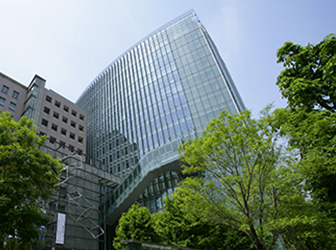
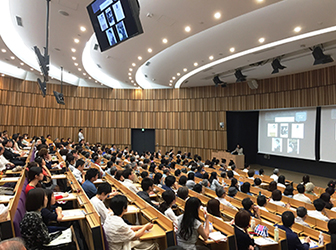
Mascot: 1One and Only Lovable Mascot Meijiro
Meijiro, the university’s mascot, was born on January 17 (the anniversary of the university’s foundation). Theory has it that Meijiro was born in the forests of Tottori, Yamagata or Fukui, which are the home prefectures of Meiji’s three founders.
As a motif, Meiji University’s official mascot character Meijiro is an owl that looks like a sage of the forest. The wings are bluish purple, which is the school color, and Meijiro’s distinctive large eyes look far into the distance. The name is a combination of "Meiji" and "fukuro" ("owl").
Meijiro loves events and cosplay. Meijiro has been featured in the media and is conspicuous around the university campuses.
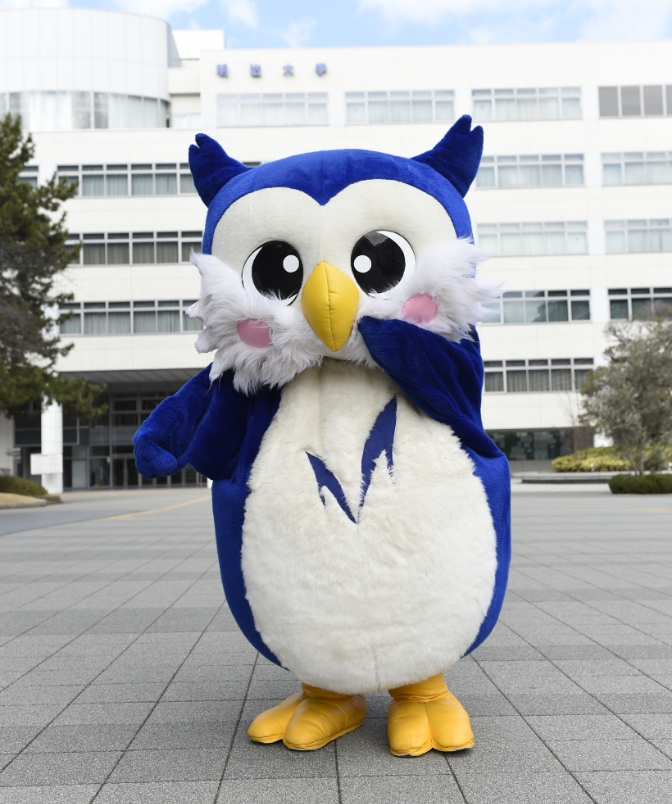
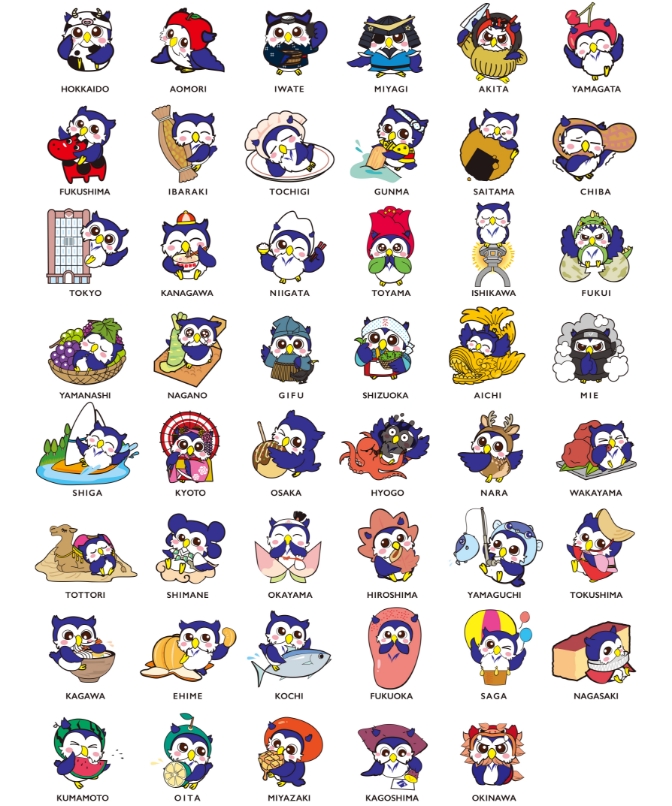
Ranking for Support in Job Hunting: 1stMeiji Excellent for Finding Employment
Meiji has a reputation of being a good university when it comes to job hunting. With over 22,000 individual student consultations and more than 300 special seminars and events a year, Meiji's job hunting support is thoroughly tailored to meet individual needs.
After determining the needs of students and companies, Meiji offers special employment support to international students every year. Workshops are held to provide guidance to international students in such areas as job hunting in Japan, self-analysis, job applications, business Japanese and preparing for written examinations. Exchange meetings are also held with international student alumni and with prospective employers.
Meiji also collaborates with other universities in hosting forums for matching international students with employers: the 9-university Joint Industry/Company Workshop (for 3rd year undergraduate and 1st year graduate students), and the 9-university Joint Employment Fair (for 4th year undergraduate and 2nd year graduate students).
* For 13 years, Meiji has been chosen as the top university (as assessed by high school career counselors) for its efforts in job hunting, according to Daigaku Sagashi (“Choosing a University”) Ranking Book 2023, produced by Daigaku Tsushin.
Examples of companies that have hired International Students from Meiji:
- IBM Japan Digital Services Company / IBM Japan Ltd / Fujitsu Limited / Accenture Japan Ltd / Amazon Japan G.K. / Micron Memory Japan, K.K. / Mitsubishi Electric Corporation / E-business Inc. / Ebara Corporation / Sun* Inc. / TIS Inc. / TDK Corporation / IBM Japan Systems Engineering Co., Ltd. / Japan Airlines Co., Ltd. / Tata Consultancy Services Japan, Ltd. / Hitachi Channel Solutions, Corp. / Fujisoft Incorporated / EY Strategy and Consulting Co., Ltd. / Calbee, Inc. / Kosé Corporation / Konica Minolta, Inc. / Suntory Group / MOL Logistics Co., Ltd., etc.
